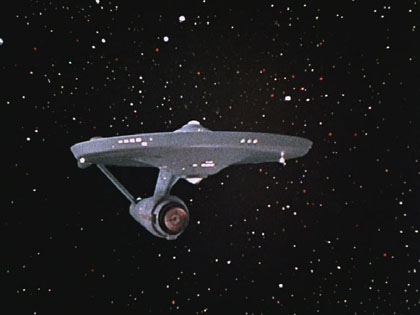It's 1964, and television Western writer Gene Roddenberry has just been rejected by NBC executives for the pilot to his new interstellar science fiction project: Star Trek. That pilot was entitled The Cage, and it was turned down on the basis that it was "too intelligent."
Damn right it was too intelligent. Not in a hard sci-fi, technological, hyper space and time travel understanding kind of way, but Star Trek was, and always has been, a show that could hack away at some of the touchiest social issues of the period for the simple reason that it's not so touchy if it takes place on another planet with a race of aliens rather than humans. Who cares if aliens live in a society of hierarchical oppression? Oh wait, that's a reflection of Western culture? Shit.
The Cage introduces the USS Enterprise and its crew: starring Mr. Spock, Captain Pike, Number One, and Yeoman Colt. If you're wondering who three out of four are, it's not because you're new to the series; the relaunched pilot, The Man Trap, reinvented the crew of the Enterprise. I only mention it because I'm about to blasphemy myself as a non-trekky when I say that Captain Pike had that perfect period acting, and character-wise, the perfect street-smarts and attitude, and here it is: I wish he had made it on to Season 1. Shatner just doesn't really do it for me. I don't get it. I guess he'll have to grow on me. I like Pike better.
"Why, oh why didn't I take the blue pill."
The purpose of his mind-trap is to get him to agree to be the partner of Vina, a human woman who was greatly disfigured in a space ship crash. As you can see, the aliens who took her in can deceive Pike's mind to make him think she is beautiful, when really she's a scarred, oldish, crone.
Oh, and the doctor (who is, I'm informed, not Dr. McCoy) reminds me of the doctor on Battlestar:
"Sometimes a man'll tell his bartender things he'll never tell his doctor."
The Cage is kind of awkward, I'll be honest. The aliens helping Vina, the Talosians (or whatever), try to manipulate Pike by capturing Number One and Yoeman Colt as well and offering either of them to be his, erm, partners, in the hopes that he will choose Vina over his female co-workers. Talk about office romance. While the show, I've heard, champions feminism, I suppose the question The Cage asks is how to deal with women entering command with concern for professionalism and sexuality. It's just so awkward because the Talosians can read the women's minds and they tell Pike that both of his co-workers have feelings for him, or would consider a sexual relationship - I mean how do you show up to the office the next day?
Well, they didn't - neither character appears in the actual pilot, The Man Trap, an episode that I felt carried some of the themes of this story, including a female who, like Vina, can change her appearance. However, unlike the Sherlock pilots, this new pilot was completely rethought, reworked from start to finish. The story that is most like The Cage is called The Menagerie, a two-parter spanning episodes 11 and 12, and in fact, The Menagerie features much of the footage from The Cage.
Needless to say, I would have liked a series that included The Cage and some of its characters.
Star Trek had a rocky history in terms of production and reception. The original pilot was rejected and it's lucky NBC bought the series and filmed a completely new one. The series was almost cancelled after Season 1, it never did well in ratings, it was moved to the Friday night death slot in Season 2 and the shows cancellation in Season 3 was hardly unforeseen - which hopefully means the original series ended on a well-written note, with a storybook ending. I'll let you know when I get there.














